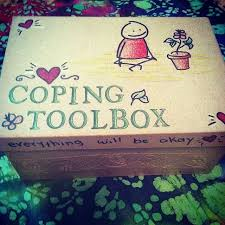
Lots of people feel anxious, panicked or stressed out. It’s a completely normal feeling and at some point, everybody will experience these feelings.
Anxiety can be helpful because back when we were all cave people, it was the sense that something didn’t feel right that helped to protect us from dangerous things like attacks from sabre tooth tigers and dinosaurs. So, being able to feel a bit anxious or panicky can be healthy.
But, sometimes it can feel out of control or get in the way of you doing your normal, everyday things.
You might find having some support with anxiety is useful if you find that you have a lot of the feelings below more times than when you feel settled and happy:
- Feeling unable to eat
- Worrying about lots of things
- Having an upset tummy
- Having shaky hands
- Getting headaches
- Thinking you are going a bit crazy
- Not being able to go to the toilet
- Feeling like you have hot flushes in your body
- Feeling fidgety, like you can’t relax or keep still
- Having problems concentrating
- Finding it difficult to sleep
- Having nightmares
- Finding it hard to breathe properly
- Finding that you are tearful or crying a lot of the time
But why do I feel anxious?
Well, usually it’s because there is something in your life that you are worried about, upset about or unsure of. Feelings of anxiety can develop because of something you have experienced yourself (a friendship that’s gone wrong, stress from school or college, someone you care about is not well, problems at home or in relationships) or maybe from something you’ve seen online or on the TV (news stories, social media posts).
We have thoughts in our mind about all sorts of things all day, every day. Lots of people have done research into the number of thoughts a human person has in any one day and these findings range from saying that we each have between 12,000 and 60,000 thoughts a day!
The National Science Foundation worked out that of those thoughts, 80% of them are negative (meaning they have feelings of sadness, anxiety, worry, panic etc attached to them) and of all of the thoughts you have in a day 95% of them are ones you’ve had before. This means, by repeating the same negative thoughts, we feel or respond in the same ways (sad, nervous, worried, angry etc) and then we act or behave in the same ways that we always have.
The positive news is that we can break this kind of cycle in our life and help ourselves to feel more in control, mentally stronger (that means in our head) and generally happier.
How can I do this?

So, what can you do to help yourself cope? Having lots of different ways to cope with these tricky feelings is a good start – we call this a self-care toolbox or toolkit.
Some examples of ‘tools’ that you could use are:
Talking: sharing what you are feeling is a good way to lessen strong emotions. Telling somebody you trust that you are worried or feel panicky about something could mean they might be able to find ways for you to cope better. Hearing the words said can help you to make sense of why you feel that way. Sharing difficult stuff means you are not dealing with it on your own. Sometimes, actually saying something out loud makes it less loud in your mind. You might decide that talking to a counsellor would be helpful.
Writing: it can be really helpful to have your own book to write down your thoughts and feelings, or even have your own worry diary. Sometimes, getting something written down about what’s going on in your head can help it to feel smaller.
Distraction: when you feel stress or worry, it can take over your whole mind and become the only thing you can think about. Giving your mind a break by doing something to distract yourself can be helpful. This might be watching TV, playing a game, reading a book, chatting with a friend, going for a walk, playing with pets, doing your homework (okay … maybe not that last one J) – basically, anything that makes you feel happy and will take your mind off the big stuff in life for a little while.
Relaxing: when you relax, your brain sends chemicals to your body that help you to feel calm, rested and happy. Doing something on purpose to help your head and body to get rid of some of the stress and worry is a really good tool to have – and it can take practice. A nice long shower, a hot bath with bubbles, playing, cycling, listening to music, chilling out looking at clouds, all of these things might be ways for you to help yourself relax.
Challenge your thoughts: yes, that’s right, you don’t have to actually believe the thoughts that are in your head. Sometimes, noticing that you’ve had a worrying thought and saying some of these things to yourself makes you see that it’s not as bad as you first thought => is that really true? Did that really happen? Is it really, really as bad as I’m thinking? What’s the worst that can happen (and what could I do about that?) If I think of this thought or feeling as a problem, how can I solve it? How else could I think about this? Do I have to think about this right now?
Get active: when you feel anxious part of your brain called the central nervous system starts producing hormones – and you can’t ever stop this. A hormone is a special chemical that helps your body to do things. So, when you panic, your brain releases things like:
- adrenaline – this makes your heart pump blood around your body faster and gives your muscles extra strength so you can run faster or get away from dangerous situations (remember the caveman & sabre tooth tiger?). You will know when your body is producing adrenaline because it makes you breathe faster, sweat and can make you feel like your heart is pounding
- cortisol – this can give you a whoosh of energy in your body to cope with the situation you are facing
What your body doesn’t know when your brain releases these hormones is that you are probably not fighting a sabre tooth tiger or about to face a life-threatening situation, but because the brain is on red alert, it sends them into your body anyway. Exercise is a great way to use these hormones up and help your body and mind to get back to a calm place. Playing a contact sport (football, rugby etc), going for a run or swim, dancing or just jumping up and down like a mad thing are all great ways to get rid of the extra hormones zooming around your body. Cleverly, when your brain realises what you are doing, it then releases other chemicals which help you feel happier:
- serotonin – this can help you feel able to sleep better, it helps to make anxious feelings smaller and it is also linked to you having a good appetite and feel happy (Guess what? Chocolate contains serotonin so there is a good, medical reason to eat it!)
- oxytocin – this is the same chemical that is released when you are hugged by someone, some research says that you can give yourself a boost of oxytocin by hugging yourself too so asking for a big hug from someone you care about is a great tool too!
Give yourself ‘worry’ time: I know this might sound a bit weird, but giving yourself a time in your week when you are going to sit and do nothing but worry, can be useful. Every time you think about the thing or things that are worrying, you tell that thought it has to wait until your worry meeting. You might decide that this is going to be every day at 3.45pm or just on a Friday at 4.30pm for 20 minutes (It’s really up to you). In that 20 minutes you will sit and think really hard about all of the things that worry you, and notice how that feels in your body. You do this for the full 20 minutes. When that time is up, all the worries are put back away into the back of your mind until your next worry meeting with yourself. The idea is that instead of worries popping up all the time, every day, you deal with them all in one space; so you can just get on with your life the rest of the time.
Remember to breathe: being aware of breathing sounds funny, but sometimes when anxiety takes over your body, you can lose your breath or find that your chest feels tighter. Remembering to breathe slowly and carefully can help. If you decide that you might like to see one of the counsellors, they have lots of different activities to help you focus on your breath, help you to be ‘mindful’ and in the moment and overall to help you to feel calm.
Remember, you are normal: possibly one of the most important messages for you to get from reading this (if you’re still with me!) is that feeling stressed, anxious, panicked, worried or any other emotion is normal. Everybody has these feelings at one time or another. It is ok to say that you need some help to deal with these things.
Summary
WOW, there is a lot of information there!
If you wanted to meet with one of our counsellors to just talk about how you cope with worry, panic, anxiety or anything else – we would be very happy to do that.
Sometimes just having one or two sessions can be enough to help you learn new tools that could make your every-day life a bit easier.
You can see all of our pictures and a bit of information about us on this website under the link “Introducing the team: Counselling – what’s it all about?”
Remember too, you can come back and read this article any time you like, however many times you like. That can be useful to help you remember some of the key messages and tools.



